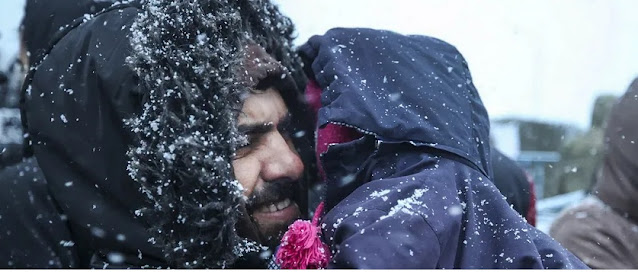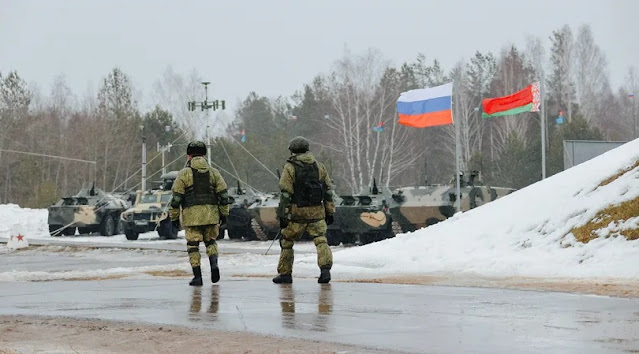Polish-Belarusian Border: "The Calls For Help Come From The Deep Forests"
At the border between Poland and Belarus, the situation is only apparently easing. Many refugees are still stuck, it is difficult to take care of them - and it is getting colder.
For weeks, the news situation on the Polish-Belarusian border was the same: Thousands of people were stuck in catastrophic humanitarian conditions between the two countries, lured by the false promise of the Belarusian ruler Alexander Lukashenko to get safe conduct into the EU. In the past week something suddenly seemed to move: The EU decided on further sanctions against the regime in Minsk, at the same time Chancellor Angela Merkel spoke to Lukashenko on the phone. Suddenly he agreed to provide overnight accommodation and buses to bring people back inland from the forests in the border area.
At that time, the Polish authorities suspected around 4,000 people in the border area. The Belarusian regime accommodated 2,000 people in a logistics center near the border, and according to official information, several hundred have also left the country by air as part of voluntary return operations. The Iraqi government, in consultation with Belarus, had begun to organize appropriate flights.
Refugees In The English Channel: France And Great Britain Blame Each Other After A Boat Accident
But where are the many others? Karol Wilczyński from Grupa Granica, one of the larger aid organizations on the Polish side, estimates that there are currently still between 2,500 and 3,000 people in the border area. The Belarusian media portal Nexta, which is critical of the regime, assumes up to 4,000 people. At the end of last week, fewer people arrived in the border area, says Wilczyński. "But now there are many. You are only forced into smaller groups than before."
There are more to come
The Polish border guards continue to report attempts by migrants to cross the de facto sealed border from Belarus to Poland; on Wednesday there were 375. There is no independent confirmation of these figures. The Polish government's news blackout is still in place, the media have no access to the border strip and aid organizations are only extremely restricted.
The doctor Wojciech Wilk is the founder and chairman of the Polish Center for International Aid Foundation, which has been caring for refugees in the forests around the border for weeks. "Our medical team is currently on the road at least once a day," he says. He also reports that the number of people who cross the border despite fences and massive police and military presence on the Polish side is increasing again after a brief decline - and with it the number of those who urgently need medical help. "The calls for help come from the deep forests, where our medical teams have to walk 20 to 30 minutes to the next street," says Wilk.
Emirates Airline Take Over The Management Of Kabul Airport
At least 13 people have now died on the border, most of them discovered on the Polish side, including a one-year-old child. A young woman lost her unborn baby. On Wednesday, the aid organization Human Rights Watch published a report on the conditions on the Polish-Belarusian border. On the one hand, it shows how catastrophic the humanitarian situation in the border area was in October. On the other hand, how systematically both sides - both the Polish and the Belarusian - try to push people to the other side of the border.
The refugees interviewed by Human Rights Watch in the border area report how they were pushed back across the border into Belarus by Polish border guards - sometimes many times - in which Poland violates European and international law. This was partly done by force . The border guards on the other hand try to force people to cross the border into Poland. A video by Polish border guards posted on Twitter on Thursday shows how they are being blinded by their Belarusian counterparts with lasers, while people are apparently trying to break through the barbed wire provisional border fence.
The Human Rights Watch report documents severe abuse by Belarusian security forces. This includes beatings and sometimes imprisonment for days without food and water. A 14-year-old girl reports that the border guards - whether accidentally or deliberately - could not be clarified - set fire to her sleeping bag and then forced her to move on, after which she wandered through the woods for days with a burn. Others tell of swamps into which they were forced and from which, in their desperation, they finally drank.
What about those who have since been accommodated by the Belarusian authorities ? Gerald Rockenschaub was on site as coordinator of the World Health Organization WHO in the past few days . The logistics hall, he says, can only be described as temporary accommodation. Basic needs are met, there are sleeping bags and hygiene items, and a Red Cross soup kitchen provides a warm meal a day. Sufficient toilets have now been delivered, while initially there were only 19 in total, and the authorities had at least guaranteed temporary showers.
EU Commission Threatens Airlines With Sanctions For People Smuggling
And yet: "It's very cramped," says Rockenschaub. "The temperatures are around 20 degrees during the day, but it should be significantly colder at night." Pictures from the hall show people sleeping on Euro pallets or sheets instead of mattresses; during the day they sit tightly packed between metal shelves, which normally store goods. Rockenschaub estimates that around half of the 2,000 people housed there are women and children.
Many have run out of medication
A big problem remains the poor state of health, in which many find themselves after an odyssey through the border area that sometimes lasts for weeks. Around 100 people in the logistics center had to be hospitalized, the main causes being pneumonia and other respiratory diseases as well as injuries from mistreatment at the border. There is also said to have been a corona case. Emergencies are treated in the surrounding hospitals, reports Rockenschaub, but chronic ailments are a problem, especially since many of them have run out of medication. The WHO is therefore sending a delivery these days with pharmaceutical emergency kits containing common drugs such as antihypertensive agents or insulin. They are enough to care for 10,000 people for three months.
It is quite possible that they will be used up completely. While the Lukashenko regime is on the one hand cooperative, the basic strategy of putting more and more refugees under pressure on neighboring European countries does not seem to have changed. This is not only supported by the constant numbers of sometimes violent attempts to cross the border reported by the Polish border guards. Although the EU had negotiated a flight stop with Turkey, machines from Istanbul and Dubai - another hub on the migration route to Belarus - landed in Minsk this week.
Even if at least a few thousand on the Belarusian side have a roof over their heads for the time being, they remain the plaything of the regime when they were brought into the country. "Belarus is not a safe country for migrants and asylum seekers," said the Human Rights Watch report. The Belarusian security forces are apparently systematically exploiting the plight of the people: some of the arrested people were supposed to pay for their release, their cell phones were taken away and only given back for money.
Taliban New Rules On Women In Afghanistan, Ban On Working In TV Dramas
Even those who are not directly stuck on the border are in an increasingly precarious position. The Polish media portal OKO.press reports that many visas with which asylum seekers originally entered Belarus are about to expire. About three families from Iraq were thrown from their accommodation as a result. Others are being ripped off by landlords in Minsk, saying that they will soon be staying illegally in Belarus and will therefore have to pay more rent.
The falling number of passengers on return flights to Iraq suggest that, despite everything, the motivation of people to return to their homeland is low. WHO coordinator Rockenschaub also reports: "The people we spoke to definitely do not want to go back. They sold some of their houses and all of their property to finance the trip."
However, they hardly have any prospect of making it to Europe after all. The EU does not want to include them, there should not be a "humanitarian corridor", as Lukashenko had publicly announced . In the "hybrid conflict" with the Belarusian rulers, the focus is instead on deterrence. "We are also defending Germany from a large wave of migrants," said Poland's Prime Minister Mateusz Morawiecki on Thursday during a visit to Berlin . The Executive Chancellor Angela Merkel said Poland had "the full solidarity" of Germany.
There is hardly any infrastructure for refugee aid
Morawiecki also met Merkel's designated successor Olaf Scholz, who has just negotiated a coalition agreement in which it is promised: "We want to end the illegal rejections and the suffering at the external borders." But even the traffic light coalition has so far given no reason to suspect that it is seriously considering taking in people from the Polish-Belarusian border area.
The Main Problem In Afghanistan Is Not Hunger, But The Payment Of Salaries, The Red Cross Said
For this, the EU pays 700,000 euros in aid to organizations like the Red Cross , so that they can take care of the local people. However, they are dependent on the cooperation of the authorities. The situation for non-governmental organizations in authoritarian Belarus is difficult; the regime has shut down 270 NGOs in the past few months . Accordingly, the infrastructure for refugee aid is hardly in existence; In addition to the supply of food and medicine, according to the Human Rights Watch report, this also affects asylum and social counseling, and there is a lack of translators and lawyers.
Videos from the border area show that weather conditions continue to deteriorate. In a recording distributed by Nexta , people are crouched on the forest floor, their bodies covered in snow.
In the coming days the temperatures hardly rise above freezing point, even during the day. "It is to be feared that with the first snow, the wood in the forest will be too wet to light a fire," says Wojciech Wilk, the doctor. People would then have no way of warming up or drying their clothes: "Hypothermia is now even more dangerous for them."
Do You Know What I Have Posted on




Comments
Post a Comment